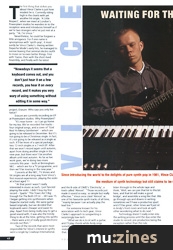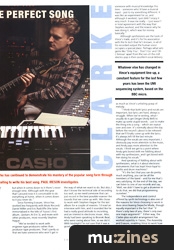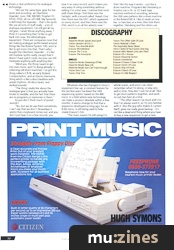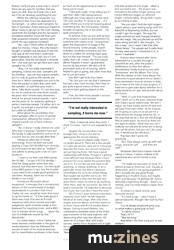Magazine Archive
Home -> Magazines -> Issues -> Articles in this issue -> View
Waiting For The Perfect Song | |
Vince ClarkeArticle from Sound On Sound, December 1988 | |
Since introducing the world to the delights of pure synth-pop in 1981, Vince Clarke has continued to demonstrate his mastery of the popular song form through the medium of synth technology. Paul Ireson investigates.
Since introducing the world to the delights of pure synth-pop in 1981, Vince Clarke has continued to demonstrate his mastery of the popular song form through the medium of synth technology but still claims to be waiting to write his best song. Paul Ireson investigates.

The first thing that strikes you about Vince Clarke is just how modest he is. Currently riding high in the charts with yet another hit single, 'A Little Respect', when we meet at London's Powerplant studios he wanders in to the reception area and introduces himself as if we're two strangers who've just met at a party: "Hi, I'm Vince."
Nevertheless, he could be forgiven a little arrogance. For if one name is synonymous with 'synth-pop', it must surely be Vince Clarke's. Having written Depeche Mode's early hits, he managed to survive leaving that seminal electro outfit to move on to even better things. First with Yazoo, then with the short-lived Assembly, and finally with his latest project, Erasure. Who says you only live twice?
Erasure are currently recording an EP at Powerplant studios. Why Powerplant?
"It's near home - so I can go home for my tea. We've recorded five tracks - four original songs, and a cover of 'God Rest Ye Merry Gentlemen' - which are going to be released in December. But it's not going to be a Christmas single. In fact, it's not going to be released as a single as such. It'll be more of a special package; two 12-inch singles or a 7-inch EP. After that we won't record again until autumn, apart from doing another single in the new year, but there won't be another album until next autumn. As far as live work goes, we're doing two more concerts this year - both at Birmingham NEC - which are for a TV programme, and then we'll be touring in the new year."
Concerts at the NEC, TV shows and hit singles are all a long way from Vince's first musical experiences, playing the violin at school aged 11.
"At that point I wasn't really interested in music as such, I just fancied playing the violin. I didn't buy my first record - Sparks' 'This Town Ain't Big Enough For The Both Of Us' - till I was 15.
I began getting into synthesizers when Depeche started really. We were guitar based originally, but we decided that keyboards were cheaper and easier to play. Apart from being really easy to get a good sound with, it was also the trendy thing to do at the time, getting into synths - there were a lot of really good electronic records out then."
Two of the records that were most responsible for Vince's interest in synths were a single by Cowboys International, and the B-side of OMD's 'Electricity', a track called 'Almost'. "Those records just made it sound so easy; so simple but really effective." Vince once cited 'Almost' as one of his favourite synth tracks of all time, "mainly because I can actually play the lead line."
For someone known for his association with hi-tech gear, Vince Clarke's approach to songwriting is surprisingly low-tech: "What we do is to sit with a guitar, and I'll play chords while Andy sings something on top, and we work on a melody. We get bits of ideas together like that, record them on a Walkman, then listen through to the whole tape and think, 'Well, we can join that bit to this bit here, and that bit will make a good bridge', and assemble a song like that. We go through ups and downs in writing: sometimes we'll have a productive spurt and it'll be great, other times we'll just sit in Andy's front room and look at each other wondering what to do next."
Technology doesn't really enter into the writing process until the duo enter the studio to record, pre-production being the exception rather than the rule.
"Sometimes we do it and sometimes we don't. We always say we should do more preparation, more pre-production, but when it comes down to it there's never enough time. Although with the gear that's around now it is conceivable to do everything at home, when it comes down to it you never do."
Since forming Erasure, Vince has worked less frequently with Mute Records' Daniel Miller and Eric Radcliffe (the latter immortalised in the title of Yazoo's first album, Upstairs At Eric's), and more with other producers, most recently Stephen Hague.
"We've tended to work with engineer-type producers rather than producer-type producers. That's partly so that we have someone who won't get in the way of what we want to do. But also, I don't know the technical side of recording too well, so we need someone that can just record in the best possible manner the sounds that we come up with. We chose to work with Stephen Hague for the last album for a couple of reasons. I'd read an interview with him, and it sounded like he had a really good attitude to recording, and an interest in electronic music. Also, Andy had been speaking to Bronski Beat, who were raving about him, so we did it. With hindsight I'm not sure that it was a good move though."
Why not?
"Well, the thing is we went for someone with musical knowledge this time - someone who'd have a musical input - just to try something different. It was like an experiment for us, and although it worked, I just didn't enjoy it very much. It was me really - I just wasn't in total agreement with the way that Stephen worked, and the reason why he was doing it, which was for money basically."
Although synthesizers are the tools of Vince's trade, and it's for his association with the hi-tech that he's known, in all of his recorded output the human voice occupies a special place. Perhaps what sets gems like 'Only You', 'Don't Go' and 'Oh L'Amour' apart from the run-of-the-mill electro-pop is their excellent vocal delivery as much as Vince's unfailing grasp of melody.
"Nowadays it seems that a keyboard comes out, and you don't just hear it on a few records, you hear it on every record, and it makes you very wary of using something without editing it in some way."
"I think that both lyrics and vocals are important, but lyrics are hard, always a struggle. When we're writing, what I usually do is get Dinger (Andy Bell) to make up some stupid words - just to make the thing into a song - which we repeat over and over. It's normally about the day before the record's about to be released that we'll finally come up with the lyrics. It's always left till the last minute. Although the vocals are very important, I obviously pay more attention to the music, and Andy pays more attention to the vocals. I think we get to a point where Andy gets bored with me fiddling about with my synthesizers, and I get bored with him doing his vocals."
And speaking of fiddling about with synthesizers, what is it about electronic instruments that has kept Vince loyal to synths and drum machines?
"It's the fact that you can do pretty much anything, you can be all the members of the band - and for me that's very satisfying. At the end of the day, we can listen to one of our records and say, 'Well, we didn't have to get a drummer in to do that, we did that programming ourselves'."
The independence and control offered by synth technology is also one of the reasons for Vince choosing to work in duos since leaving Depeche Mode, though equally important is the fact that "if there's only two of you, there's only ever one major argument!". Either way, the Clarke-plus-vocalist arrangement has worked superbly in Yazoo, The Assembly and Erasure, enabling Vince to work how he chooses, and with the minimum of interference from others.
On the subject of equipment, Vince shows a clear preference for analogue technology.
"We use the same basic gear for live work and recording: an Oberheim Xpander, Juno 106, MKS80, Prophet VS, D550, S550, all run off UMI. My favourite is definitely the Xpander - that's the synth. We use all sorts of stuff really - a lot of analogue equipment. I've still got all my old gear, I never throw anything away. I think it's something that I'd like to get back into now, the old analogue equipment. There are companies now that are making analogue synths based around things like the Roland System 100, and I'd like to get more into that. That's why I bought the Oberheim Xpander — it's like old modular synths really, except that it doesn't have patch cords, but you can still modulate anything with anything else.
"Mind you, the thing I want to get into even more, and I'm doing already, is collecting old drum machines. I've got this thing called a CR78, an early Roland Compurhythm, and an Electro Harmonix thing which is like a disco beatbox with preset rhythms. All disco beats, and wicked sounds!
"The thing I really like about the analogue gear is that you actually have knobs to twiddle, and the fact that there are no programs or memories in them."
So you don't think much of preset sounds?
"No, but we do use them sometimes, I can't say that we don't. Nowadays it seems that a keyboard comes out, and you don't just hear it on a few records, you hear it on every record, and it makes you very wary of using something without editing it in some way. I noticed that most with three things: first there was the Fairlight, with a sound called 'Aaaah One'; then there was the DX7, which appeared on every record; and then there was the D50, which is on all the adverts now."
Whatever else has changed in Vince's equipment line-up, a constant feature for the last few years has been the UMI sequencing system, based on the BBC micro. In a field where new technology can make a product obsolete within a few months, it seems strange to find that a sequencer developed so long ago, for an 8-bit micro, is still being used to help create Erasure's hits.
"The main reason I'm still using it is that I like the way it works - just like a drum machine. Programs like Steinberg or Voyetra use a 24- or 32-track tape machine method of recording, whereas the UMI uses patterns like a drum machine or the Roland MC4. I like to work on one bar, or two bars at a time, then link them together. Steinberg and the others use whole tracks, and since I can never remember what I'm doing, or play very well in time, they don't suit me at all. I like to get short patterns together, and work on just two bars at a time.
"The other reason I've stuck with it is that I've always used it, so I'm very familiar with it. Also the guy who makes it, Lynton Naiff, gives me really good backup - it's not like a dead-end thing where you have to buy a new sequencer to get a new feature, he'll just put a new chip in. And if there are any specific facilities that you want on UMI, then he'll look into it and see if he can develop something for you."
Whilst the UMI has remained, one instrument that Vince has disposed of is his Fairlight - or rather both Fairlights, for two of Australia's finest were purchased to allow Yazoo to go out on the road. Having used both the Fairlight and the Synclavier, I wondered whether Vince felt that such high-powered computer systems were worth the vast expense involved?
"Whatever else has changed in Vince's equipment line-up, a constant feature for the last few years has been the UMI sequencing system, based on the BBC micro."
"No, I don't think either of them are value for money. I mean, the only reason I bought a Fairlight was because it was the only way at the time that I could have eight keyboards in one unit, but it's not good value. And the Synclavier's certainly not - not now you can get Akai and Casio samplers for £250.
"Also, I'm not really interested in sampling, it bores me now. Samplers are too limiting - you can buy a good sampler, but it's only as good as the sounds you have for it. Which inevitably turn out to be from the packet of disks that came with the sampler, or stuff that your mate's done. Take drum sounds: it's not very easy for me to come across new drum sounds, because I don't know many drummers.
And as for actual musical sounds, I can't see the point of, for instance, getting a perfect marimba sample. I'd rather do it on a synth, try and get a sound that's similar but a little bit different."
What about the possibilities that some samplers offer in terms of sample manipulation, allowing the creation of original sounds out of fairly ordinary samples?
"No, it doesn't really interest me, and who does it anyway? Samplers have got the facility to add waveforms and so-on to a sound, but no-one actually does that."
Always an advocate of cheap technology, Vince has been pictured playing a Casio DH100 MIDI horn recently, an instrument he describes as "brilliant", and admits to being quite a fan of Casio products.
"I want to try their new MIDI guitar, the PG380 - I've got a PG510 already. I tried the Stepp guitar when that was around, but they went bust. I've tried quite a few MIDI guitars in fact, but the trouble is you need to be a really good guitarist to use them. Anyway, there are no lead breaks in our songs."
During our discussion about equipment, it emerges that a miniaturised version of the current breed of budget workstations is a product that Vince Clarke, for one, would be more than keen to lay his hands on. "It'd be really good if there was a box that was an 8-track sequencer with drum sounds and eight polyphonic synth modules inside, a mini keyboard for inputting music, and a MIDI Out to transfer all the songs... about the size of a Walkman would be fine." Absolutely!
For some reason, Vince Clarke has never seemed comfortable in the glare of media attention that has followed the success of each of his musical ventures, but he nevertheless professes to like fame as much as the opportunity to make a living out of music.
"I like both really. I'd be telling lies if I said that I didn't like being famous. Although you moan about it all the time -'Oh God, another TV show to do' - if it wasn't there you'd only be moaning about something else. But fortunately, nobody actually recognises me in the street - I'm quite anonymous."
To achieve chart success with all four of his projects is quite an achievement for someone who claims to be "anonymous", given the importance of image in the record industry. Some people, myself included, would be inclined to put this down to a talent for writing classic pop, but not the man himself: "I'm just lucky really, that's all. I mean, the first Erasure album flopped, it wasn't guaranteed success by any means. We did a lot of promotion and a lot of touring, which helped to get us going, but other than that we've just got lucky."
You don't get lucky four times.
"No, but you can say that if someone has had a few chart records, then they've got quite a good chance of their next record at least getting played on the radio."
True, but then most people's success tends to decline, not increase.
"I'm not really interested in sampling, it bores me now."
"Well, it depends what they write. I think I'm lucky - but I'm not ungrateful for it."
Despite the success that it has brought him, Vince is not one to glamourise the record industry.
"It's a load of rubbish really, there's no doubt about it. There are a few people in it who are sincere, who are in it because they like the music, but record companies are just big machines. We have a good relationship with Mute, though it's getting more difficult now because there's more pressure for us to exploit the position that we're in. It's not like we ever have to do anything, or release anything, or do a particular remix, but there is pressure nevertheless for us to do certain things that maybe we'd prefer not to do. The main problem is that over the last two years there's been no time to do anything other than, well, be successful. No time to lead a normal life. I'd really like to decorate my house, but I just don't have the time!"
DISCOGRAPHY
Depeche Mode Speak And Spell
Yazoo Upstairs At Eric's
Yazoo You And Me Both
Erasure Wonderland
Erasure The Circus
Erasure The Innocents
SINGLES
Depeche Mode Dreaming Of Me
Depeche Mode New Life
Depeche Mode Just Can't Get Enough
Yazoo Don't Go
Yazoo Only You
Yazoo The Other Side Of Love
Yazoo Nobody's Diary
The Assembly Never Never
Vince Clarke & Paul Quinn One Day
Erasure Who Needs Love Like That?
Erasure Oh L'Amour
Erasure Heavenly Action
Erasure Sometimes
Erasure It Doesn't Have To Be
Erasure Victim Of Love
Erasure Ship Of Fools
Erasure Chains Of Love
Erasure A Little Respect
All of Vince's past ventures have been relatively short lived. He left Depeche Mode at an early stage, after only three singles and one album, and then went on to form Yazoo with R'n'B vocalist Alison Moyet. During its brief lifetime, this combination provided some of the finest pop moments of the early Eighties, self-destructing after only two albums. Alf went on to a major deal, and major success, whilst Vince dropped out of sight for a while, re-appearing to storm the charts once more with The Assembly and 'Never Never'. Although The Assembly only ever produced one single - albeit a very successful one - the project was intended to be rather longer-lasting, and involve different singers on different singles. Unfortunately, things didn't quite go according to plan.
"We just didn't find the right singers. I spent about a year writing songs with Eric Radcliffe at Blackwing Studios, but we couldn't get the singers. The way the single worked out with Feargal [Sharkey] was like magic. We just phoned up and he came along and did it. We thought, 'Oh, this is easy', but it wasn't like that after 'Never Never'. The people we'd really liked to have used weren't interested in it, or weren't available."
Erasure were formed after Vince advertised for a vocalist through a classified ad and, after the public's indifference to their first album Wonderland, finally found success with 'Sometimes' and the album The Circus. With the release of their third album The Innocents, Erasure became Vince Clarke's most permanent musical venture to date, but in view of the fate of past projects, it's hard not to speculate about whether he is easily bored by set-ups, and wonder about the future.
"Well, it's just that relationships didn't work out in the past, whereas Andy and I have a good relationship. We don't argue, we have similar points of view and we learn from each other. As for Erasure, we're going to carry on as we are for a while before we change what we do, or the way that we do it. But we will change that at some point. As much as there are our egos to satisfy, I think that you can't really be too old and do what we're doing. You can do music, but you can't be a pop star. It would just be ridiculous."
Pop stars don't grow old gracefully...
"No! They always come up with naff songs, and look naff... and they are naff!"
Whatever directions Erasure may be taking in future, it seems unlikely to be inspired by any current trends in pop music.
"I'm really not very keen on Acid. It's almost as bad as American rock. Equally as destructive, and it's not going anywhere. I don't actually see any good things happening in modern music, but maybe that's just because I'm getting old. Acid is definitely a bad thing though - there's no melody, and I've never heard a classic Acid record."
So what is a classic record, your favourite record?
"It's hard to say - I don't have a special favourite, though I like stuff by Paul Simon."
You've always produced great pop, so what makes a good pop record?
"A catchy chorus."
That's it!?!?
"Not too long."
And what's the best song you've ever written?
"I haven't written it yet. I'm waiting for it."
He's not the only one.
More with this artist
Downstairs At Erics (Vince Clarke) |
Reset For Success (Vince Clarke) |
Sounding Off (Vince Clarke) |
In Clarke's Shoes (Vince Clarke) |
Vince Clarke’s Wall Of Sound (Vince Clarke) |
Home is where the art is (Vince Clarke) |
More from related artists
Depeche Mode (Depeche Mode) |
When The Wave Forms (Depeche Mode) |
The Basildon Bond (Depeche Mode) |
Recording Mode (Depeche Mode) |
A Clean Slate (Erasure) |
Clarke Techniques (Erasure) |
Modes of Operation (Depeche Mode) |
You And Me Both (Erasure) |
Mode-Al (Depeche Mode) |
Publisher: Sound On Sound - SOS Publications Ltd.
The contents of this magazine are re-published here with the kind permission of SOS Publications Ltd.
The current copyright owner/s of this content may differ from the originally published copyright notice.
More details on copyright ownership...
Artist:
Vince Clarke
Role:
MusicianSongwriterKeyboard Player
SongwriterKeyboard Player
Keyboard Player
Related Artists:
Erasure
Depeche Mode
Robert Marlow
Alison Moyet
Interview by Paul Ireson
Help Support The Things You Love
mu:zines is the result of thousands of hours of effort, and will require many thousands more going forward to reach our goals of getting all this content online.
If you value this resource, you can support this project - it really helps!
Donations for September 2025
Issues donated this month: 0
New issues that have been donated or scanned for us this month.
Funds donated this month: £0.00
All donations and support are gratefully appreciated - thank you.
Magazines Needed - Can You Help?
Do you have any of these magazine issues?
If so, and you can donate, lend or scan them to help complete our archive, please get in touch via the Contribute page - thanks!

























